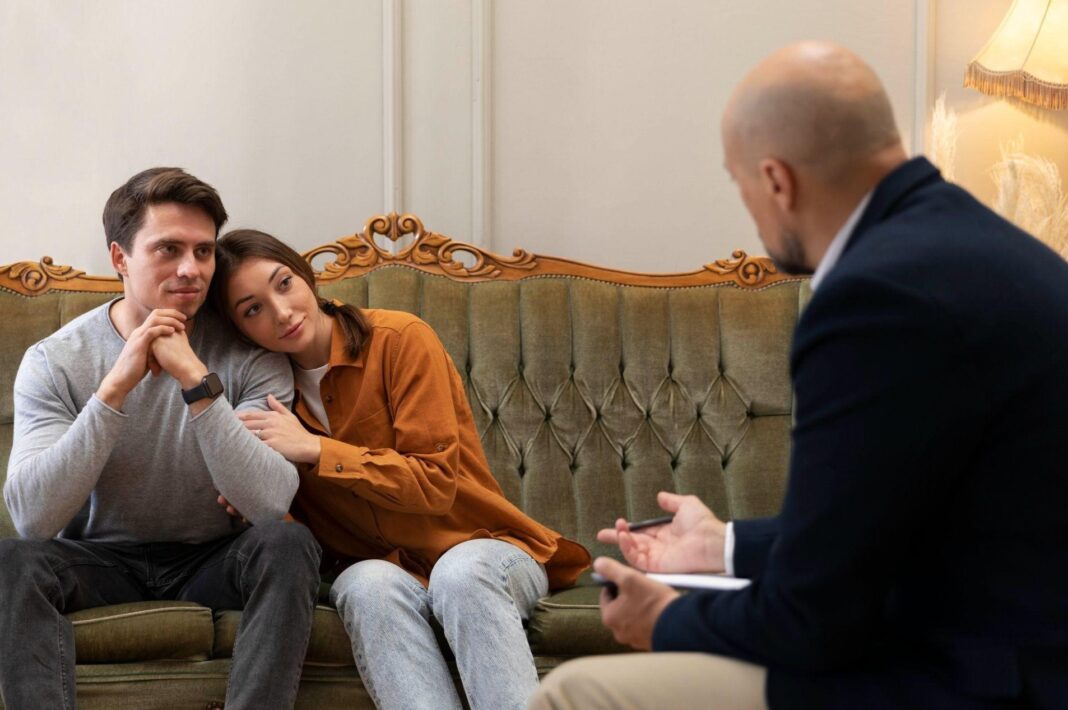For couples with communication issues, belief concerns, or further wedded hurdles, marriage counseling can be a favorable resource. A lot of couples turn to therapy to work through concerns and discover new methods to enhance their relationship. Even though a few people might be unwilling to demand assistance, it’s crucial to keep in mind that getting advice from a qualified expert can result in beneficial relationship changes that last a lifetime.
During marriage counseling, you can expect to work through both individual and shared issues with the guidance of a therapist. Along with the provision and execution of plans for obtaining past roadblocks, this action repeatedly entails candid and open communication. Matrimony therapy can offer a secure environment for couples to explore their feelings, comprehend one another’s viewpoints, and pick up new communication skills—even though the road may not always be simple. Couples can strengthen their relationship and give it more strength to overcome life’s hurdles by promising to go behind the process and being neutral toward exchange.
- Exploring underlying issues
- Developing better communication skills
- Learning to manage conflict effectively
- Setting goals and working towards them together
- Strengthening emotional intimacy
Exploring underlying issues
Many couples seek marriage counseling because they are facing challenges in their relationship that seem impossible to overcome on their own. One of the key effects of marriage counseling is to survey the basic issues that may be related to the problems in the relationship.
When couples come to therapy, they are often focused on the surface-level issues that are causing conflict. These may involve fights about finances, parenting, or communication breakdowns. Anyhow, more often than not, these surface-level issues are just symptoms of deeper, underlying issues that need to be addressed.
One of the first steps in exploring underlying issues in marriage counseling is to create a safe and open space for both partners to express themselves honestly and openly. This can be difficult, particularly if there are long-standing motifs of communication that have become settled in the relationship. A skilled therapist will work to create an environment where both partners feel heard and realized, permitting them to search for the root causes of their conflicts.
In probing for basic issues, a therapist may help couples search for their past happenings, childhood stress, and family motions that may be affecting their present-day kinship. Many couples are amazed to find that their ongoing conflicts are often tied to pending issues from their past. By combining the flecks of past happenings and present-day strife, duos can gain a vaster grasp of their kinship instability.
Detecting observable patterns that might cause complications in the relationship is an essential part of marriage counseling’s research on basic affairs. Patterns of control, avoidance, blaming, or emotional disengagement may be examples of this. Couples can start working regarding the final noxious cycles and evolution of better communication and conflict resolution skills by identifying and raising awareness of these tendencies.
Searching for basic issues in marriage counseling further relates to the role that a person’s beliefs, values, and expectations play in the relationship. Many couples enter into marriage with unspoken assumptions about roles, responsibilities, and ideals that can create tension when they are not aligned. By searching for and addressing these basic beliefs, couples can work against evolution to gain a shared grasp of what they want their kinship to resemble.
In marriage counseling, examining underlying problems is ultimately a process of self-reflection, development, and self-discovery for both couples. To truly embrace it, one must possess honesty, vulnerability, and the courage to face uncomfortable realities about their relationship and themselves. A stronger, more satisfying relationship can only be built through this process, despite the fact that it can occasionally be difficult and uncomfortable.
Developing better communication skills
Communication is often cited as one of the most important aspects of a successful marriage. Without clear and effective communication, misunderstandings can arise, emotions can escalate, and the connection between partners can deteriorate. That’s why a key pivot of marriage counseling is always improving communication skills.
You and your mate will have the probability to know and trial a diversity of communication skills in marriage therapy, which can improve your ability to listen to one another, express yourself, and resolve issues in a constructive and healthy manner.
One of the first things you may work on in counseling is learning how to truly listen to your partner. This means not just waiting for your turn to speak, but actively engaging with what your spouse is saying, showing empathy, and trying to understand their perspective. This can be unusually tough, particularly when affections are high, but it is an essential talent for useful communication.
The capacity to effectively express your demands, wants, and views is another essential intercourse talent in marriage counseling. To do this, you must be kind and non-defensive while being open and sincere with your spouse. It’s essential to strike a balance between telling your truth and declaring kindness for your partner, as well as being robust without becoming disputed.
Learning to manage conflict effectively
For couples who are finding it hard to settle strife in their relationship, marriage counseling can be an obliging resource. Any relationship will inevitably experience conflict, but the long-term health of a marriage depends on the couple’s ability to manage and come to good resolutions for their differences.
It is usual for couples to evolve more effective conflict management techniques during marriage counseling. Active listening is a prevalent method that is frequently instructed. When you listen to your partner actively, you provide them with your undivided attention, take the time to hear and comprehend their point of view, and then politely share your feelings. In settling strife, this can greatly help in making both partners feel heard and appreciated.
A further essential element of handling strife effectively is learning how to regulate yourself effectively. This means avoiding negative communication patterns such as criticism, contempt, defensiveness, and stonewalling. Instead, couples can work on using “I” statements to express their feelings and needs, being willing to compromise, and focusing on finding solutions rather than placing blame.
Couples who search for marriage counseling can also know how to realize their cause and grasp the basic problems that potency induces their clash. Couples can start deciding their conflicts more advantageously by understanding the basic reasons behind their arguments. Examining prior encounters, insecurities, or irrational expectations that are fueling the conflict may be part of this.
Setting goals and working towards them together
Wedded counseling can be a very effective strategy for couples to settle conflicts and enhance their union. Simultaneously, defining and achieving goals is a crucial part of the counseling process.
Both couples should be upfront and truthful about their goals when starting marriage counseling. Talking about things that have been causing strain in the relationship, like communication breakdowns, trust concerns, or disagreements over parenting techniques, may be one way to do this. In order to produce a powerful and extra pleasing relationship, couples might benefit from having a sense of purpose and direction through goal-setting.
Terrain ambitions in marriage counselling can range from short-term objectives, such as enhancing communication expertness or deciding unique conflicts, to long-term goals, such as building trust and intimacy or rekindling the spark in the relationship. These goals should be specific, measurable, achievable, relevant, and time-bound (SMART), in order to ensure that progress can be tracked and celebrated along the way.
Working toward these purposes together calls for commitment and effort from both partners. This may involve attending counselling sessions regularly, participating in homework assignments or exercises given by the therapist, and practicing new communication or conflict resolution strategies outside of the therapy sessions. It is essential for couples to communicate overtly and honestly with each other throughout the counselling process, seeing their thoughts, feelings, and concerns in a respectful and non-judgmental manner.
Strengthening emotional intimacy

Marriage counselling can be a precious tool to reinforce inner intimacy between partners. Emotional intimacy is the deep connection and bond that two people share that goes beyond physical attraction or surface-level conversation. It is the ability to truly understand, support, and be vulnerable with one another.
During marriage counselling, couples can expect to work on building and enhancing their emotional intimacy through various techniques and exercises. One common method used by therapists is open and honest communication. This implies creating a timid space for both partners to convey their thoughts, feelings, and unease without fear of judgment or backlash.
Therapists may also coach couples on effective communication skills, such as active listening and expressing emotions without blaming or criticizing one another. Learning how to communicate effectively can help build trust and understanding in the relationship, leading to a stronger emotional connection.
In conclusion:
Wedded therapy can provide a rocky context for partners to settle their strife, improve communication, and forge a powerful, healthier bond. Counseling has many potential advantages, albeit occasionally being difficult. A couple can position themselves for long-term success and satisfaction in their relationship by going into counseling with an open mind and a willingness to collaborate.


